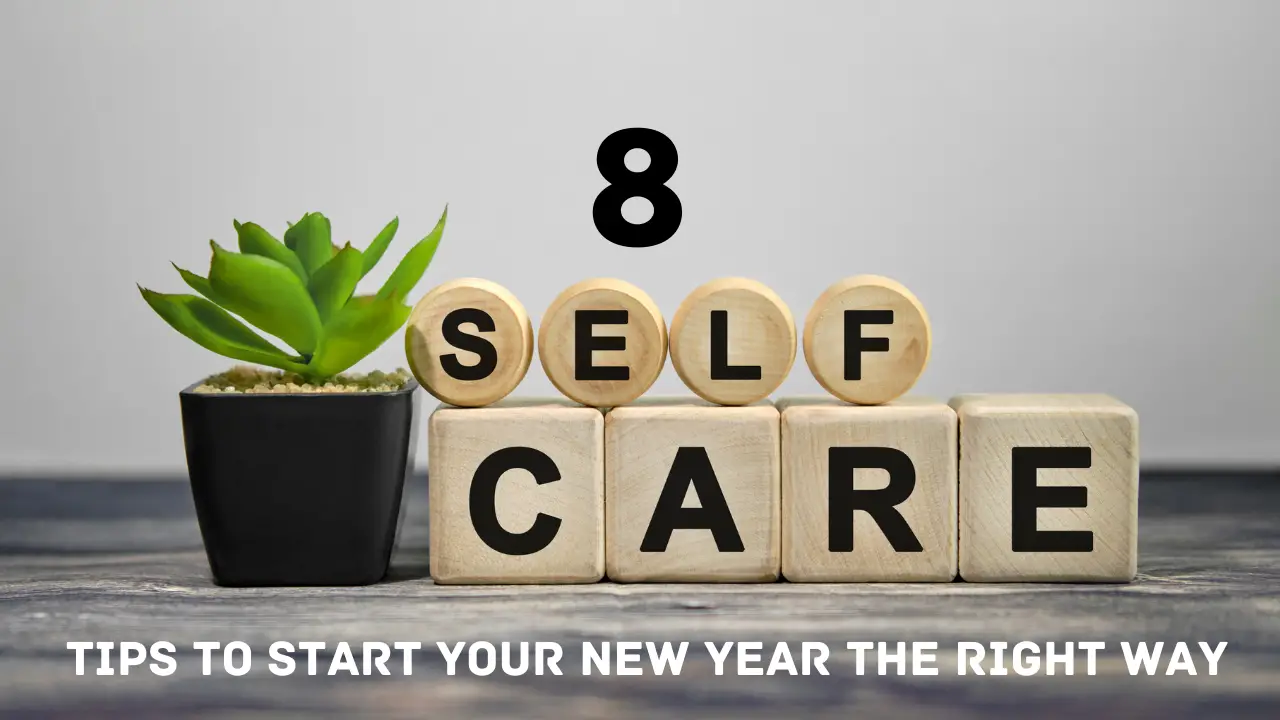The start of another year is all about making resolutions and sticking to them. Unfortunately, most stray from this path after a few months, if not weeks, into the year. It can undoubtedly get tricky with piling assignments, work, and commitments.
We often push self-care to the back of our list, only to maybe forcefully take 10 minutes out on the weekend. In reality, you should be incorporating self-care daily. A few changes here and there can inspire you to live your best life when you're regularly practicing self-care.
Here's a disclaimer- it's not just about a relaxing bath but extends to your professional and social life too. This New Year, make these self-care tips a part of your day to live a healthier, happier life:
Move Your Body
Ever since the pandemic, people have shifted more towards a sedentary lifestyle. They used to go into offices, schools, or colleges and move around. Whenever someone ran out of groceries, they'd usually head up to the supermarket and buy everything they needed. Now, online jobs, schools, and colleges have started worldwide.

Moreover, stores and supermarkets have started home deliveries, reducing the need to go directly into the store.
But even if you are using these services, that doesn't mean you become physically inactive. Use this New Year as an opportunity to start any physical exercise that you like and are interested in.
It can be an early morning walk routine, an hour of playing soccer, or an intense evening workout session daily. But whatever it is, make sure you incorporate it into your routine and consistently do it.
Moving around and staying active helps your body and mind in several ways. For starters, physical exercise reduces the risk of chronic diseases, such as COVID, cancer, type 2 diabetes, and metabolic syndrome.
Moreover, an active person can manage their weight more efficiently, have stronger muscles and bones, and have increased pain tolerance.
Hence, try your best to improve your physical and mental health by increasing the amount of movement and activity.
Choose To Be Mindful About The Foods You Are Eating
The next best thing you can do for your physical health is pay attention to your diet.
Your body requires nutrients and vitamins for normal functioning. For instance, your body needs proteins for muscle formation. An adequate amount of carbohydrates are necessary for supplying the body with the required energy.

At the same time, fats provide a layer of insulation and act as an energy reservoir. Eating a balanced diet ensures you fulfill all the daily dietary requirements of these nutrients.
If a person eats lots of unhealthy fats and reduces their intake of carbs, they're very likely to become obese. Similarly, a deficiency of proteins can cause stunted growth in children, increased risk of infections, and loss of muscle mass.
Inflammation is caused by eating processed foods. If you are eating whole foods, you reduce inflammation caused by seed oils. Seed oils are in most processed and packaged foods.
Pay attention and read ALL ingredients that are listed. Stay away from canola, soybean, palm, corn, and sunflower. Only eat and use olive, coconut, and avocado oils.
So, from this year onwards, make a promise to take care of yourself by taking care of your diet.
Getting Adequate Sleep
Next up in your self-care routine is getting enough sleep.
As a kid, it was everyone's fantasy to stay awake until late at night. But, our parents were right in making us go to sleep on time so that we weren't sleep-deprived. Sleep deprivation directly affects the quantity of ghrelin, a hormone that causes hunger pangs.
Moreover, a sleep-deprived person gets tired mentally and physically earlier than someone who gets enough sleep. Getting enough sleep bolsters your immune system, boosts your mood, and gets you ready to get through the next day.

Try to remove all the triggers that disturb your nightly routine and don't let you sleep soundly and peacefully. Caffeine and sugar have a high tendency to disrupt your sleep cycle.
Most of the time, stress is a significant contributor to keeping us awake all night. Once you identify the triggers, try to get rid of them so that you can get an adequate amount of sleep.
Don't Overlook Your Mental Health
A new year demands a healthier, prosperous, new you, which you can't achieve without stable mental health.
Consider this example. If you injure your leg, you give it a few days' rest. You don't put too much weight on that leg. You apply ointments on the wound and bandage it. Similarly, whenever you feel down or depressed, take some time off to properly heal. Even when you feel alleviated, make some effort to look after your mental health.
Some people think that excessive usage of mobile devices and staying on social media causes stress and anxiety. Do a digital detox now and then, and you'll feel the effects almost instantly.

Engage in any non-work hobby that suits your interest, and make some time for it daily. It's never too late to learn piano that you so badly wanted to since childhood. Experts suggest that having a pet has a great boost on your mental health and has a significant impact.
Pay Attention To Work That Is Wearing You Down
Most of us, if not all, have experienced that toxic boss that uses their authority to disrespect your professional boundaries. Instead of admitting their mistake, they may blame you and, as a punishment, increase your workload. If you're currently going through this situation, this article is your cue to stand up for yourself.
If your work environment is supportive and nothing like what we just talked about, you're fortunate. But even then, there's a lot to do. Negotiate your needs and requirements, state your professional boundaries clearly and distinctly, and don't let anyone cross them.

Utilize your vacation days and sick days appropriately instead of stacking them. It's tough to concentrate on work for a long time continuously. Hence, experts suggest taking frequent short breaks, as this enhances productivity and increases your concentration span.
Once you start implementing these professional self-care tips, your work-related life will no longer be a burden for you.
Declutter Your Surroundings
Nothing helps you mentally and the environment around you more than staying neat and tidy.
Experts suggest that people who live a chaotic life constantly surrounded by clutter often suffer from mental illnesses. Keeping your home and workspace organized and decluttered helps relax your mind and significantly impact your wellbeing. No wonder “cleanliness is close to Godliness.”

And the best thing is, environmental self-care isn't that hard. After every meal, whether in your home or office, stash the leftovers in the refrigerator. Either wash the dishes yourself or stack them in the sink. Don't let leftover food along with the plates stay on the table any longer than they should.
To reduce paper clutter in your home, start keeping soft copies of all the bills and important documents. If you have kids or live with kids, you can use bins and baskets to organize their stuff.
Also, do not purchase products and things you do not need. If you don't have a place for an object you are buying, don't buy it.
Start this New Year by organizing your living space, and you'll notice how much less stress you feel.
Dealing with Your Finances Efficiently
Staying on top of your finances and dealing with them efficiently is an integral part of your self-care regime.
Practicing financial self-care helps you avoid any unpleasant surprise, such as a missed deadline or a due date. Moreover, instilling mature and positive monetary habits help prevent a deficit while boosting your mental health by reducing anxiety.

There are many ways to observe financial self-care. Experts suggest that instead of running away from your monetary issues, face them head-on. Some people start binge-watching Netflix whenever they feel the financial strain.
A better alternative is to spend that time analyzing your budget and reviewing your spending. Make a spreadsheet to document all sources of income and expenses and critically evaluate them.
If you're tumbling into deficit, divide your expenses into “essential” and “leisure.” Then, create realistic goals and slowly start cutting down some of those leisure expenses. Or, you can listen to a podcast for professional advice on dealing with your finances efficiently.
Healthy Socialization
Whenever we talk about self-care, its social aspect does not come to mind instantly. But, it has equal importance as any other form of self-care, if not more.
Healthy socialization and close relationships and connections with other people are necessary to live a happy, healthy life. Even when you feel mentally strong, you could use a shoulder to cry on now and then.
You might think it's impossible to maintain these relationships and socialize with the pandemic. Honestly, you can still spend quality time with your friends and family and build on those relationships.

Like your professional life, your social life should also have some boundaries that you are very clear and firm about. Don't let anyone cross those boundaries, no matter how close they are. If they are doing it repetitively and have no regard whatsoever, you need to maintain a healthy distance from them.
A social relationship only works when both sides are putting in an effort. Reaching out, offering support and help, and taking the initiative to make a meetup plan sends a positive message. It shows that you care about the relationship and gives you a sense of fulfillment and satisfaction.
Final Thoughts
Practicing all of these self-care tips at once may seem like a lot of work. Choose one step at a time and gradually incorporate them into your lifestyle.
This way, these self-care practices won't seem like a chore, and you'll be directing your routine to a better route.
Start with one, and once you've incorporated it into your life, move on to the next.




